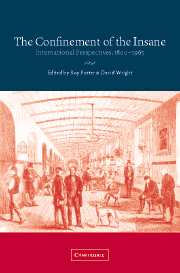Book contents
- Frontmatter
- Contents
- List of figures
- List of tables
- Notes on contributors
- Acknowledgements
- Introduction
- 1 Insanity, institutions and society: the case of the Robben Island Lunatic Asylum, 1846–1910
- 2 The confinement of the insane in Switzerland, 1900–1970: Cery (Vaud) and Bel-Air (Geneva) asylums
- 3 Family strategies and medical power: ‘voluntary’ committal in a Parisian asylum, 1876–1914
- 4 The confinement of the insane in Victorian Canada: the Hamilton and Toronto asylums, c. 1861–1891
- 5 Passage to the asylum: the role of the police in committals of the insane in Victoria, Australia, 1848–1900
- 6 The Wittenauer Heilstätten in Berlin: a case record study of psychiatric patients in Germany, 1919–1960
- 7 Curative asylum, custodial hospital: the South Carolina Lunatic Asylum and State Hospital, 1828–1920
- 8 The state, family, and the insane in Japan, 1900–1945
- 9 The limits of psychiatric reform in Argentina, 1890–1946
- 10 Becoming mad in revolutionary Mexico: mentally ill patients at the General Insane Asylum, Mexico, 1910–1930
- 11 Psychiatry and confinement in India
- 12 Confinement and colonialism in Nigeria
- 13 ‘Ireland's crowded madhouses’: the institutional confinement of the insane in nineteenth- and twentieth-century Ireland
- 14 The administration of insanity in England 1800 to 1870
- Index
12 - Confinement and colonialism in Nigeria
Published online by Cambridge University Press: 24 July 2009
- Frontmatter
- Contents
- List of figures
- List of tables
- Notes on contributors
- Acknowledgements
- Introduction
- 1 Insanity, institutions and society: the case of the Robben Island Lunatic Asylum, 1846–1910
- 2 The confinement of the insane in Switzerland, 1900–1970: Cery (Vaud) and Bel-Air (Geneva) asylums
- 3 Family strategies and medical power: ‘voluntary’ committal in a Parisian asylum, 1876–1914
- 4 The confinement of the insane in Victorian Canada: the Hamilton and Toronto asylums, c. 1861–1891
- 5 Passage to the asylum: the role of the police in committals of the insane in Victoria, Australia, 1848–1900
- 6 The Wittenauer Heilstätten in Berlin: a case record study of psychiatric patients in Germany, 1919–1960
- 7 Curative asylum, custodial hospital: the South Carolina Lunatic Asylum and State Hospital, 1828–1920
- 8 The state, family, and the insane in Japan, 1900–1945
- 9 The limits of psychiatric reform in Argentina, 1890–1946
- 10 Becoming mad in revolutionary Mexico: mentally ill patients at the General Insane Asylum, Mexico, 1910–1930
- 11 Psychiatry and confinement in India
- 12 Confinement and colonialism in Nigeria
- 13 ‘Ireland's crowded madhouses’: the institutional confinement of the insane in nineteenth- and twentieth-century Ireland
- 14 The administration of insanity in England 1800 to 1870
- Index
Summary
In a recent article Shula Marks has asked, what is colonial about colonial medicine? The answer, of course, depends in part on what one considers ‘colonial’ to mean. One of the benefits – perhaps unexpected – of the growth of studies of colonial medical institutions in recent years has been a growing appreciation of the diversity of colonial contexts, the recognition that colonialism was not the same in all places. This chapter seeks to contribute to that understanding by posing the question, what was distinctively colonial about the confinement of the insane in Nigeria, with an emphasis on institutions in the southwest of the country?
The history of Nigeria's asylums re-enacted developments common in the comparative history of psychiatric institutions, but also illustrates themes peculiar to the politics and priorities of colonialism. In the beginning, the institutions were, like many colonial imports, already obsolete by metropolitan standards, replicating many of the faults British psychiatry had come to pride itself on overcoming. For most of the early twentieth century, colonial officials in Nigeria lamented the state of the asylums and planned fitfully to reform them. But when reform was achieved in the late 1950s and early 1960s, it was contemporary with Nigeria's gradual shift to independence, and the reform was largely accomplished through the initiatives of Nigerians.
Victorian Britain enacted a series of dramatic changes in lunacy policy, including increased institutionalization, the rise of ‘moral treatment’ and other optimistic therapies.
- Type
- Chapter
- Information
- The Confinement of the InsaneInternational Perspectives, 1800–1965, pp. 299 - 314Publisher: Cambridge University PressPrint publication year: 2003
- 1
- Cited by



